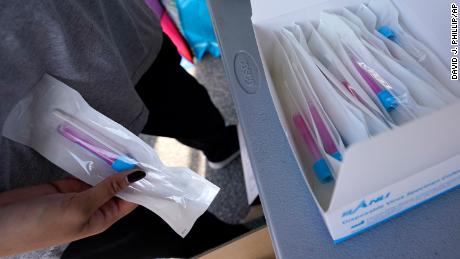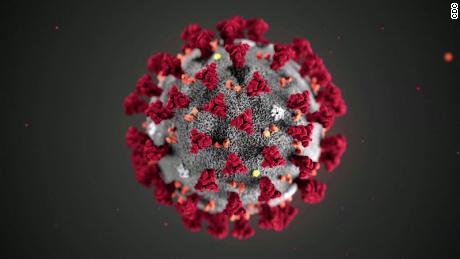Eleven states also confirmed mixing viral and antibody test results.The CDC says it's planning to separate those numbers in the coming weeks, but experts say the current method is unhelpful and potentially misleading.That's because antibody tests aren't used to diagnose current infections or determine whether someone is potentially contagious. Instead, they indicate whether someone has been exposed to the virus in the past.Combining numbers from antibody and viral tests pushes up the total number of tests conducted in the US. But antibody tests are often intended for the general public — not just people with suspected infections — so they can skew a key indicator of how the pandemic is progressing: the percentage of tests that come back positive.The CDC's method makes it appear that the US has greater capacity to test than it really does, at least when it comes to identifying current infections."It's not useful information, unless you have a political agenda that you're trying to back up. That's really the only reason to do that," said CNN medical analyst Dr. Celine Gounder, a professor of medicine and infectious diseases at the New York University School of Medicine."This is just one more example of why we're very concerned that science is being suppressed at the CDC and is taking a back seat to political priorities in this administration," she said.Whether the combined numbers are coming from states and being republished by CDC — or whether the CDC is misconstruing the numbers itself — Gounder said the data are concerning. The numbers can make it seem like states have enough testing capacity and are ready to lift restrictions, when that might not be the case. "This is pretty basic molecular biology 101 that any college student who has studied this stuff would have some basic understanding of," she said. "So CDC epidemiologists know this."News of the agency combining viral and antibody tests was first reported by Miami-based public radio station WLRN and in the Atlantic magazine. CDC spokeswoman Kristen Nordlund described the agency's practice to CNN on Thursday and confirmed it the next day."Initially, when CDC launched its website and its laboratory test reporting, viral testing (tests for current infection) were far more commonly used nationwide than serology testing (tests for past infection)," she said in an email. "Now that serology testing is more widely available, CDC is working to differentiate those tests from the viral tests and will report this information, differentiated by test type, publicly on our COVID Data Tracker website in the coming weeks."
"This is pretty basic molecular biology 101 that any college student who has studied this stuff would have some basic understanding of," she said. "So CDC epidemiologists know this."News of the agency combining viral and antibody tests was first reported by Miami-based public radio station WLRN and in the Atlantic magazine. CDC spokeswoman Kristen Nordlund described the agency's practice to CNN on Thursday and confirmed it the next day."Initially, when CDC launched its website and its laboratory test reporting, viral testing (tests for current infection) were far more commonly used nationwide than serology testing (tests for past infection)," she said in an email. "Now that serology testing is more widely available, CDC is working to differentiate those tests from the viral tests and will report this information, differentiated by test type, publicly on our COVID Data Tracker website in the coming weeks."
Two very different types of coronavirus tests
Viral tests, or diagnostic tests, are able to identify current infections. Often called PCR or antigen tests, they look for signs of active infection. A positive test result means someone is potentially contagious — although some tests have accuracy problems.Antibody tests, in contrast, identify whether someone has been infected by the virus in the past, not whether they're currently infected. As the CDC states on its website: "Antibody tests should not be used to diagnose someone as being currently sick with COVID-19."Currently, the CDC says that about 12.9 million tests have been reported in the US, although it cautions that not all tests are reported to the agency. Still, data from independent labs suggests that a substantial number of tests conducted in the US are antibody tests. Quest Diagnostics said on Monday that it had performed about 1 million antibody tests. LabCorp, another clinical laboratory, said it has performed more than 700,000 as of Friday. Both companies say they have far greater capacity to perform antibody tests than viral tests. Quest said it can run 70,000 viral tests per day, compared to 200,000 antibody tests. LabCorp says it can run more than 75,000 viral tests a day, compared to more than 200,000 antibody tests.The difference between the tests matters, because the percent of tests that come back positive — the so-called positivity rate — is a critical indicator for whether states are ready to reopen. It's a sign of the progress that the country is, or isn't, making on the virus — and antibody tests can complicate thRead More – Source
Quest Diagnostics said on Monday that it had performed about 1 million antibody tests. LabCorp, another clinical laboratory, said it has performed more than 700,000 as of Friday. Both companies say they have far greater capacity to perform antibody tests than viral tests. Quest said it can run 70,000 viral tests per day, compared to 200,000 antibody tests. LabCorp says it can run more than 75,000 viral tests a day, compared to more than 200,000 antibody tests.The difference between the tests matters, because the percent of tests that come back positive — the so-called positivity rate — is a critical indicator for whether states are ready to reopen. It's a sign of the progress that the country is, or isn't, making on the virus — and antibody tests can complicate thRead More – Source
[contf] [contfnew] 
cnn
[contfnewc] [contfnewc]






